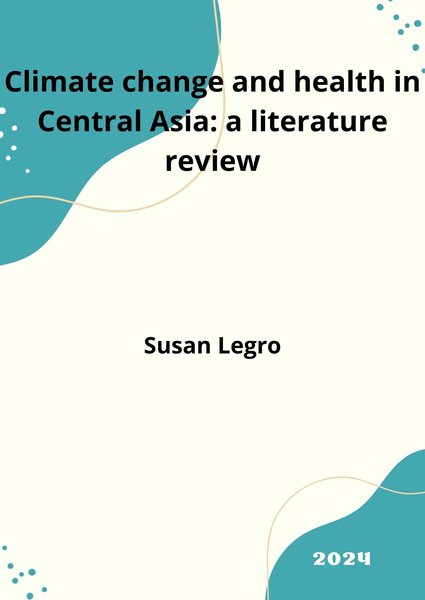




Year: 2024
Collections: Scientific Publications
Topics: Climate
Authors: Susan Legro
Countries: Kazakhstan, Kyrgyzstan, Uzbekistan, Tajikistan, Turkmenistan
Source: Central Asian Journal of Sustainability and Climate Research
Countries in Central Asia, which are highly vulnerable to climate change, experience a variety of health-related impacts to which they must adapt. At the same time, climate mitigation interventions in the health sector in the form of reduced greenhouse gas (GHG) emissions may also generate co-benefits. This article briefly outlines current understanding of the relationship between climate change impacts and human health in Central Asia and establishes a scope of inquiry based on climate and health linkages as identified by the Intergovernmental Panel on Climate Change (IPCC). It then identifies and summarizes existing research and reporting on this topic in the region as presented in published literature, country reporting to the United Nations Framework Convention on Climate Change (UNFCCC), and gray literature, including policy literature and documentation of donor-funded development interventions in the region. This review, which attempts to summarize and appraise those efforts, has found that both peer-reviewed and grey literature on this topic must be used with caution. The most frequent problems with peer-reviewed and grey literature resources involved confounding bias, and—to a lesser extent—self-reporting bias. The use of an appraisal framework for grey literature sources can frame these diverse resources in the proper context, identify potential shortcomings, and gain insights into current priorities and future direction for research on climate change and health in the region.
Downloads:
Countries in Central Asia, which are highly vulnerable to climate change, experience a variety of health-related impacts to which they must adapt. At the same time, climate mitigation interventions in the health sector in the form of reduced greenhouse gas (GHG) emissions may also generate co-benefits. This article briefly outlines current understanding of the relationship between climate change impacts and human health in Central Asia and establishes a scope of inquiry based on climate and health linkages as identified by the Intergovernmental Panel on Climate Change (IPCC). It then identifies and summarizes existing research and reporting on this topic in the region as presented in published literature, country reporting to the United Nations Framework Convention on Climate Change (UNFCCC), and gray literature, including policy literature and documentation of donor-funded development interventions in the region. This review, which attempts to summarize and appraise those efforts, has found that both peer-reviewed and grey literature on this topic must be used with caution. The most frequent problems with peer-reviewed and grey literature resources involved confounding bias, and—to a lesser extent—self-reporting bias. The use of an appraisal framework for grey literature sources can frame these diverse resources in the proper context, identify potential shortcomings, and gain insights into current priorities and future direction for research on climate change and health in the region.
По всем вопросам сотрудничества обращайтесь по эл.адресу или телефону: